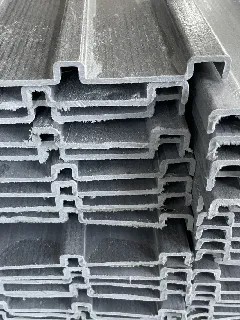loading...
- No. 9, Xingyuan South Street, Dongwaihuan Road, Zaoqiang County, Hengshui, Hebei, China
- admin@zjcomposites.com
- +86 15097380338
- Welcome to visit our website!
frp water storage tank
FRP Water Storage Tanks A Sustainable Solution for Modern Water Management
In today’s world, the need for efficient and reliable water storage solutions has never been more critical. With increasing urbanization, climate change, and growing population demands, finding ways to effectively store water is essential. One innovative approach that has gained popularity is the use of Fiber Reinforced Plastic (FRP) water storage tanks. These tanks are providing sustainable and durable options for various applications in both residential and industrial sectors.
What is an FRP Water Storage Tank?
FRP tanks are made from a composite material that combines fiberglass reinforcement with a polymer matrix. This unique composition gives FRP tanks several advantages over traditional materials such as concrete and steel. Lightweight yet incredibly strong, FRP tanks can be manufactured in different sizes and shapes to meet a variety of storage needs. Their corrosion resistance makes them particularly suitable for storing water, as they do not rust or degrade over time when exposed to moisture or chemicals.
Advantages of FRP Water Storage Tanks
1. Durability One of the standout features of FRP tanks is their longevity. Unlike metal tanks that are prone to rusting and concrete tanks that can crack, FRP tanks maintain their structural integrity over time, even under extreme conditions. This durability ensures that the water remains clean and safe for use.
2. Lightweight FRP tanks are significantly lighter than their concrete or steel counterparts. This characteristic not only makes them easier to transport and install but also allows for more flexibility in placement without the need for extensive support structures.
3. Corrosion Resistance The chemical resistance of FRP makes it an ideal material for storing a variety of liquids, including aggressive chemicals and wastewater. This capability extends the lifespan of the tank and reduces maintenance costs associated with other materials.
4. Customizability These tanks can be tailored to suit specific requirements. Whether for rural or urban applications, FRP tanks can be designed to meet the unique specifications regarding capacity, dimensions, and additional features, such as insulation for temperature regulation.
frp water storage tank

5. Cost-Effectiveness While the initial investment in an FRP tank may be higher than traditional options, the long-term savings are significant. Reduced maintenance costs, longevity, and energy savings make FRP tanks a cost-effective choice over time.
Applications of FRP Water Storage Tanks
The versatility of FRP tanks means they find applications across many industries. In residential settings, they are often used for potable water storage, rainwater harvesting, and greywater systems. In the commercial and industrial sectors, FRP tanks are ideal for storing chemicals, wastewater, and even food products, where hygiene and safety are paramount.
Furthermore, FRP water tanks are gaining traction in agricultural settings, where they can be utilized for irrigation systems or livestock watering. Their corrosion resistance and ability to withstand varying temperatures make them particularly suited for these demanding environments.
Environmental Impact
In addition to their practical benefits, FRP water storage tanks also contribute positively to environmental sustainability. Their longevity reduces waste from having to frequently replace tanks, and their efficiency contributes to better water management in communities, helping to conserve resources.
As global awareness about water scarcity and environmental issues grows, the adoption of FRP tanks represents a forward-thinking approach to water storage solutions that aligns with sustainable practices.
Conclusion
As we navigate the challenges of modern water management, the advantages of FRP water storage tanks stand out as a smart, durable, and sustainable solution. With their ability to resist corrosion, lightweight nature, and customizability, they serve as an efficient alternative to traditional storage options. As industries and communities continue to seek ways to manage their water resources effectively, FRP tanks will play an essential role in shaping the future of water storage. Investing in FRP technology not only addresses immediate water storage needs but also fosters a more sustainable approach to resource management in the long run.
-
Why Choose a Galvanized Water Tank for Your Storage NeedsNewsMay.21,2025
-
The Strength and Durability of FRP GratingNewsMay.21,2025
-
The Importance of Water Treatment Systems for Clean and Safe WaterNewsMay.21,2025
-
The Advantages of FRP Rebar for Construction ProjectsNewsMay.21,2025
-
Say Goodbye to Hard Water with a Reliable Water SoftenerNewsMay.21,2025
-
Maximize Your Water Storage with a Sectional Water TankNewsMay.21,2025
-
The Power of Filter VesselsNewsMay.19,2025
